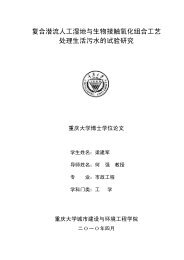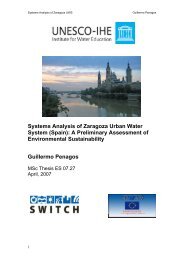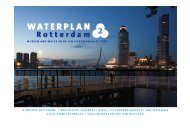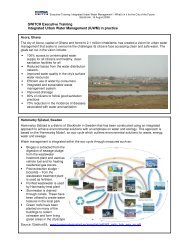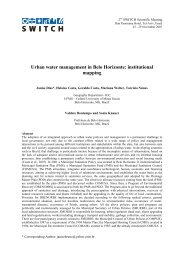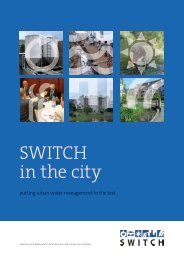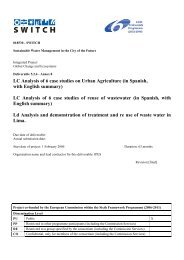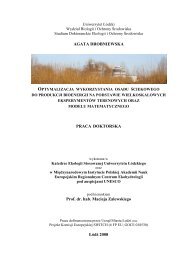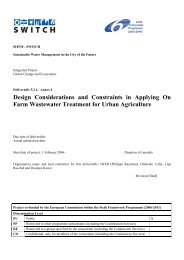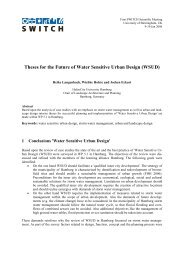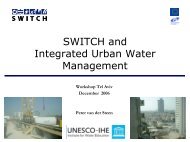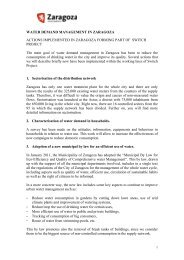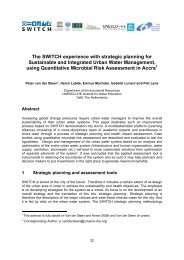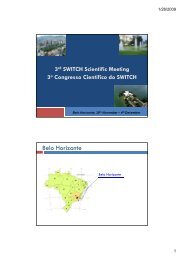Good practices for Social inclusion - Case studies and summary
Good practices for Social inclusion - Case studies and summary
Good practices for Social inclusion - Case studies and summary
Create successful ePaper yourself
Turn your PDF publications into a flip-book with our unique Google optimized e-Paper software.
Positive outcomes of the MTA process<br />
<br />
<br />
<br />
<br />
<br />
more reliable access to drinking water in the neighbourhood, with less erratic supplies<br />
every 18 to 20 days rather than every 45 days <strong>and</strong> <strong>for</strong> longer periods at a time;<br />
community members (elected by the wider neighbourhood) manage the project <strong>and</strong> there<br />
is a greater sense of ownership <strong>and</strong> determination to succeed than otherwise would be<br />
the case;<br />
the MTA have increased underst<strong>and</strong>ing of the problems of access to clean drinking water<br />
in the area amongst local authorities, water company etc;<br />
the MTA members themselves have gained confidence <strong>and</strong> learned new skills in<br />
managing the project with support from Hidrocapital officers;<br />
increased water access has helped to reduce social tensions locally.<br />
Source : ¿‚AquÍ, el Pueblo decide‛? Nuevas Formas de Participación Ciudadana. In<strong>for</strong>me de<br />
Investigación Compartiendo Descubrimientos con los Participantes de Investigación, Octubre<br />
2007. Accessed at: http://www.brad<strong>for</strong>d.ac.uk/acad/icps/<br />
Box 13 : Positive outcomes of the MTA process<br />
As well as these incipent positive outcomes, a number of challenges have also been<br />
encountered (see Box 14 below).<br />
Challenges <strong>and</strong> lessons from the La Pedrera MTA experience<br />
<br />
<br />
<br />
Lack of confidence in the process: Not all local residents are willing or interested in participating,<br />
partly because of the past failures of government initiatives <strong>and</strong> instances where resources<br />
allocated to community projects have disappeared;<br />
Sustaining official support can be tricky: Public policies can change rapidly. Staff turnover<br />
among key officials can affect continuity. Work by the MTA has been delayed on a number of<br />
occasions because of policy changes <strong>and</strong> resource blockages in the Ministry, undermining the<br />
local credibility of the MTA core group.<br />
Difficulties in achieving an inclusive process: In a context of insecurity <strong>and</strong> severe poverty.<br />
Women in La Pedrera have to combine paid work as well as their domestic duties, limiting<br />
their ability to participate in such processes. All locals, but particularly women, are fearful of<br />
attending meetings <strong>and</strong> assemblies in the evening as they say it is too dangerous to travel<br />
about after dark, given the violence occurring in the ‘barrios’.<br />
Source : ¿‚AquÍ, el Pueblo decide‛? Nuevas Formas de Participación Ciudadana. In<strong>for</strong>me de<br />
Investigación Compartiendo Descubrimientos con los Participantes de Investigación, Octubre<br />
2007. Accessed at: http://www.brad<strong>for</strong>d.ac.uk/acad/icps/<br />
Box 14 : Challenges <strong>and</strong> lessons from the La Pedrera MTA experience<br />
Conclusions<br />
Participatory governance innovations can improve poor people‟s lives. In the Caracas<br />
case, participatory management has helped to bring about improvements in water services in<br />
La Pedrera municipality. In Porto Alegre benefits have included rapid increases in sewer line<br />
construction <strong>and</strong> road paving in poorer parts of the city.<br />
101



